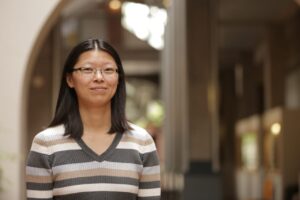
- General Information
- Symposia
- Atomic Layer Deposition
- Biomaterials and polymers
- Characterizacion and metrology
- Luminescence Phenomena
- Microelectronics and MEMS
- Nanostructures
- Plasma and Vacuum
- Renewable Energy: Materials and Devices
- Semiconductors
- Tribology, Surface and Interfaces
- Theory and Simulation of Materials
- Thin Films
- Science Outreach
- Plenary Lectures
- Short Courses
- Book of Abstracts
- General Program
- Agenda
- Poster Session
- Oral Session
- Congress Registration
- Abstract Submission
- Committees
- Fees
- Awards/Grants
- Athletic race 2025
- Sponsors and exhibit
- Hotel Accomodation
In situ transient absorption spectroscopy during materials formation

Cathy Wong is an Associate Professor in the Department of Chemistry and Biochemistry at the University of Oregon. She received a B. Sc. from McMaster University in 2004 and a Ph. D. from the University of Toronto in 2011. After an NSERC Postdoctoral Fellowship at the University of California at Berkeley, she joined the University of Oregon in 2015. Prof. Wong is a spectroscopist with a particular interest in measuring the formation and degradation of materials systems in situ, while they are undergoing chemical change. Using an ultrafast laser, she has pioneered the use of single-shot transient absorption to measure the formation and processing of organic thin-films and the growth and degradation of semiconducting nanocrystals. Prof. Wong received a National Science Foundation CAREER award for this work. She is also the faculty sponsor for a Community for Minorities in STEM at the University of Oregon.
In situ transient absorption spectroscopy during materials formation
Molecules, polymers, and nanocrystals can form the active layer in electronic devices such as photovoltaics and light-emitting diodes. Their electronic structure and excited state dynamics dictate their function and suitability for these applications. Transient absorption (TA) spectroscopy is used to measure these properties, and has provided remarkable insights into the behavior and function of electronic materials. However, multiple minutes-to-hours are typically required to perform these measurements, making it difficult to accurately measure the excited state dynamics of unstable and evolving materials systems such as electronic materials during their synthesis or deposition into a thin film. In this seminar, I will introduce a novel implementation of TA spectroscopy that can measure transient spectra in 8 ms, with good signal-to-noise achieved in ~30 s. This new technique is applied to the study of organic molecules during their aggregation into a thin film, as well as lead-halide perovskite nanocrystals during their synthesis. These examples demonstrate that in addition to providing an understanding of how excited state dynamics change during materials formation, TA signals measured in situ can reveal new insights into the mechanisms of complex materials formation processes.
Congress Registration
Early Bird Payment
August 31, 2025
Abstract Submission
Abstract submission deadline
June 22, 2025
Key Dates
Abstract Submision Deadline:
June 22, 2025
Intercovamex Award Best PhD and Master´s Thesis:
August 31, 2025
Student grant application deadline:
July 4, 2025
Franscisco Mejia Lira Award:
August 31, 2025
Early Bird payment:
August 31, 2025
